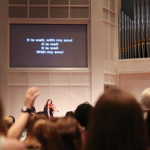Posted: 4/17/06
Lenten observance 'culture shock'
for some DBU students
DALLAS—Students who entered chapel at Dallas Baptist University recently found themselves immersed in ancient traditions different from the worship styles with which many of the evangelical students are familiar.
“Lord, make me an instrument of your peace,” read Rose Johnson, associate professor of English. The lights were lowered and the students stood and repeated St. Francis of Assisi’s prayer with reflection.
The worship experience marked one aspect of Lenten observance at DBU.
“It was a culture shock at first,” said Lauren Hickman, a senior. Like many of her classmates, the only dates of the Christian calendar she had previously celebrated were Christmas and Easter. Hickman has since become fascinated with the ancient holiday’s historical, ecclesiastical and spiritual significance.
“It shocked but also drew me to Christ and made me feel connected to the universal church, like standing in a great cloud of witnesses,” she said.
The Lenten observance was part of DBU’s worship formation program, which began three years ago. Through this program, DBU is seeking to find ways to practice new forms of praise, rediscover old traditions and emphasize worship as a way of life.
“We’re borrowing elements we think are important for students—the reading of Scripture, the confession of sins, the importance of learning from history,” explained Philip Mitchell, assistant professor of English and director of DBU’s honors program. “At the same time, we’re using elements from our own tradition, including congregational singing and spontaneous prayers. We’re not giving that up.”
Mitchell participates in the worship formation committee along with several other DBU faculty, staff and students. The committee currently plans special chapel services for Advent, Epiphany, Lent, Holy Week, Pentecost and All Saints. Celebrating historical church holidays and introducing elements from liturgical-style worship is as much an educational experience as it is a spiritual one, Mitchell explained.
“The goal is to educate students about these things, introducing them to a more complex, deep, and unusual worship,” he said.
Though pointing out that the Bible nowhere mandates these traditions, Mitchell has found that observing Lent enriches his faith. He compares Lent’s emphasis on personal reflection and confessing sins to Baptist tent revivals, where people confronted their sins and made life-changing decisions.
“For myself, confession is always followed by forgiveness and growth, which, in turn, leads to great joy,” he said.
For all the variations of preference and practice, however, only one thing really matters, he insisted. “If worship doesn’t confront us with who God is, we’ve failed,” Mitchell said.















We seek to connect God’s story and God’s people around the world. To learn more about God’s story, click here.
Send comments and feedback to Eric Black, our editor. For comments to be published, please specify “letter to the editor.” Maximum length for publication is 300 words.